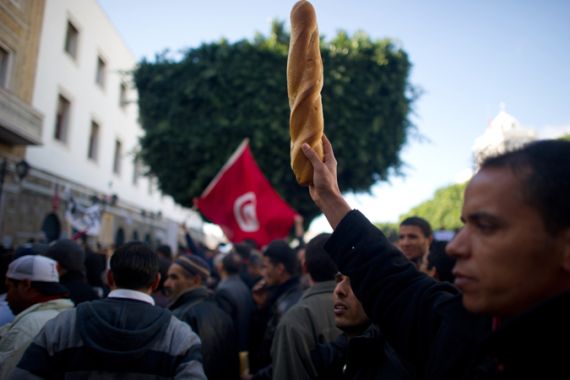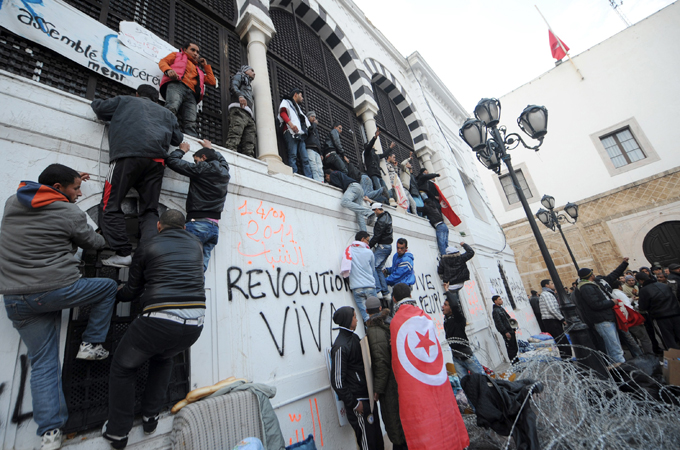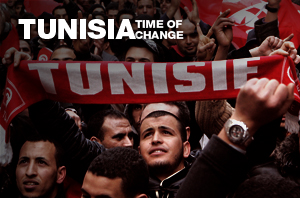Tunisia cabinet to be reshuffled
Politicians said to be meeting to negotiate the creation of a committee of “wise men” to replace current government.

 |
| Demonstrations continue in Tunis as protesters demand ‘national unity’ government step down [AFP] |
Tunisian politicians are reportedly negotiating the creation of a committee of “wise men” to replace
the interim government and “protect the revolution”.
Sources have told the Reuters news agency on Monday that the committee could include respected opposition politician Ahmed Mestiri.
The comments echo that of the country’s army chief, Rachid Ammar, who also vowed to “defend the revolution” that ousted former president Zine El Abedine Ben Ali, but warned of a “power vacuum” that may result if a solution to the subsequent political crisis is not found.
He made the comments on Monday after clashes broke out in Tunis between stone throwing protesters and the police outside the prime minister’s office, aimed at pressuring the interim ‘national unity’ government to step down.
“Our revolution, your revolution, the revolution of the young, risks being lost … There are forces that are calling for a void, a power vacuum. The void brings terror, which brings dictatorship,” Ammar said.
He also appealed to protesters to clear the ministerial quarter where they were assembled “to let this government work, this government or another one.”
Ammar is hugely popular in Tunisia as the opposition says he was sacked by Ben Ali in the final days of the government for refusing to shoot on protesters.
He was then apparently reinstated by the new transitional government.
During the demonstrations, protesters threw stones and smashed a police vehicle during the clash. The Reuters news agency also reported that several windows of the finance ministry building had been broken.
Before the skirmish, protesters said the situation outside the buildings was “very, very tense as they spent the night outside… They were told by security forces to leave the area, and tension mounted for some time”, Al Jazeera’s Hashem Ahelbarra reported from the site of the protest on Monday morning.
The protesters said they would “continue [their] sit-in for as long as it takes, until [they] topple the government”, Ahelbarra said.
Areas sealed off
Security forces have sealed off the entrances into the area immediately surrounding the prime minister’s and interim president’s offices, on concerns over the build-up of protesters.
In so doing, they divided the protesters into a group of several hundred who were within the PM’s office compound, and a larger number of demonstrators who were outside.
 |
| Follow Al Jazeera’s coverage of the turmoil in Tunisia |
Monday also marks the end of a period of national mourning that was called by the unity government to remember those who have died in the protests so far.
The country is not likely to return to business as the General Union of Tunisian Workers (generally known by its French acronym, UGTT) has called an indefinite strike. The UGTT has refused to recognise the current government, and has demanded the ouster of all former ruling party officials from the governance structure.
“We support the demands of the people. The UGTT will never abandon the people in their struggle to demolish the old regime,” Nabil Haouachi, a representative of the teachers’ union within the UGTT, told the AFP news agency.
The teachers are demanding that RCD head-teachers and senior management leave their posts.
‘Liberation caravan’
Earlier, Tunisian protesters travelled hundreds of kilometres in what they call a “Liberation caravan” to join demonstrators in the country’s capital.
The protesters entered Tunis on Sunday, tearing through the barbed wire surrounding the office of Mohamed Ghannouchi, the interim prime minister, and demanding an end to his government.
The march began on Saturday night from Menzel Bouzaiane, a small town in the same province as Sidi Bouzid – the site of the self-immolation suicide attempt that set off a month of protests and ultimately ousted former president Zine El Abidine Ben Ali.
The crowd walked on foot for about 50km before boarding buses to Tunis, where they arrived on Sunday and began assembling in front of the interior ministry – the site of many previous anti-government demonstrations.
Meanwhile, the country’s state news agency reported on Sunday that allies of Ben Ali – Abdelaziz bin Dhia, Ben Ali’s spokesman and chief adviser, and Abdallah Qallal, a former interior minister and head of Tunisia’s appointed upper parliamentary house – had been placed under house arrest.
State media also reported that Abdelwahhab Abdalla, Ben Ali’s political adviser and media czar, had been placed under house arrest.
Larbi Nasra, the owner of Hannibal TV and another Ben Ali supporter, and his son, have been arrested on suspicion of “treason” for working on Ben Ali’s return from Saudi Arabia (where the deposed president is currently in exile).
‘Spontaneous protests’
Nasra, the agency reports, is related to Ben Ali’s wife, Leila, and while the channel was taken off the air for about two hours, no official reason was given for why its transmission was interrupted other than to say that it was an error.
Al Jazeera’s Ahelbarra said that the protests were “spontaneous” and “unorganised”, adding that those who were demonstrating on Monday morning were “saying they were the backbone of the revolution and that they do not belong to any political party”.
The interim authorities have not specified when elections would be held, though the constitution requires a presidential vote within 60 days.
Meanwhile, Nicolas Sarkozy, the French president, said on Monday that his country had previously “underestimated” the anger of the Tunisian people against Ben Ali.
Speaking to reporters in Paris, Sarkozy acknowledged that France had been slow to speak out against Ben Ali, but added that he had to be very careful not to be seen as interfering in the sovereignity of the former French colony.
Sarkozy also announced that his country would offer emergency aid to Tunisia during this transition period.
“I have asked [prime minister] Francois Fillon to prepare measures that will be presented to Tunisia to help the transitional government, especially on the economic front,” he said.
Earlier on Monday, the US State department said that Hillary Clinton, the US secretary of state, had called prime minister Ghannouchi, saying that the US was encouraged by the indications that the interim government is trying to be inclusive.